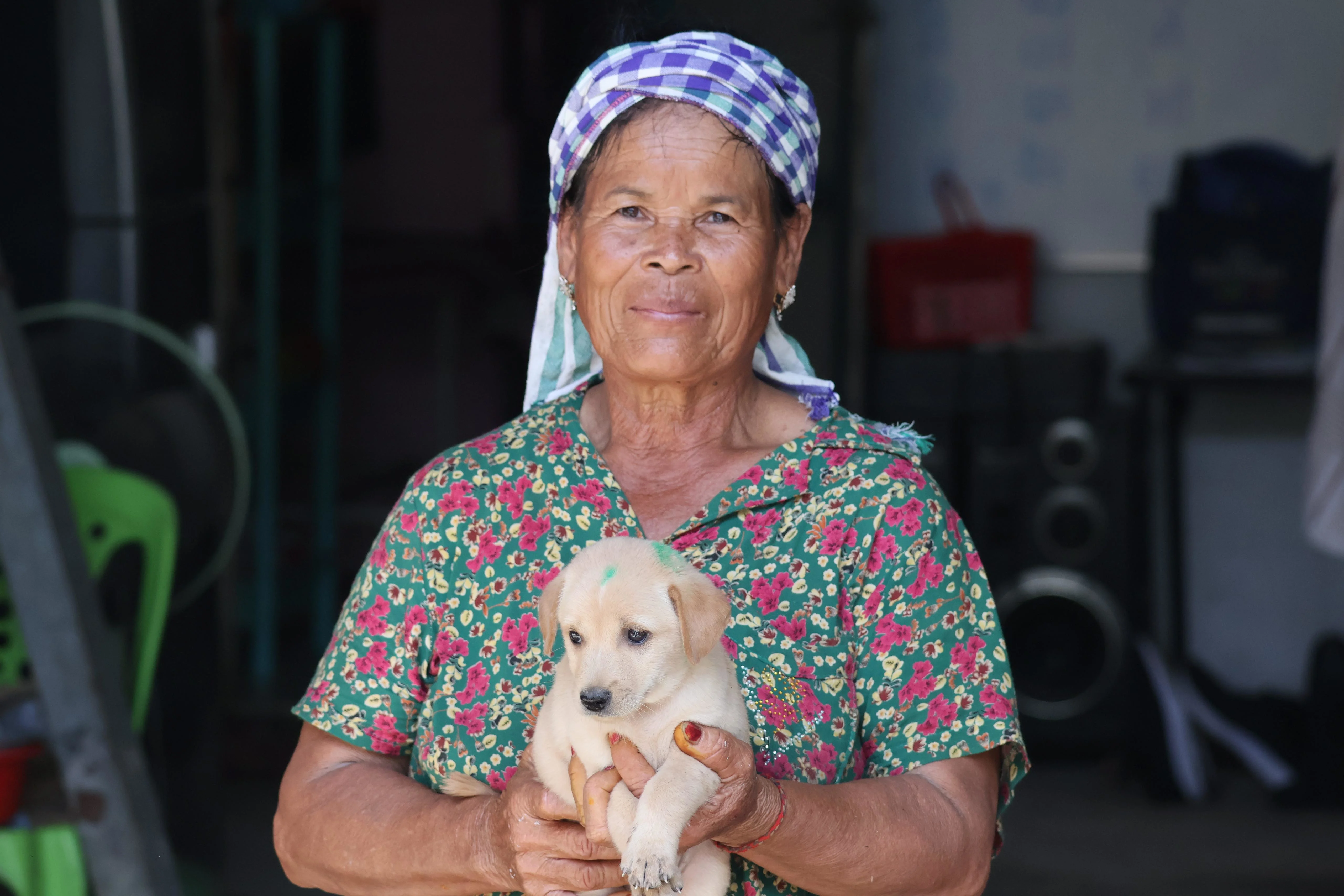
Nearly 59,000 humans die from rabies each year, and nearly half of those deaths occur in children.1 Mission Rabies is charting a course to end rabies and save human and animal lives.
In Cambodia, where rabies is endemic, over 400 human deaths are caused by rabies infections each year,2 although there are likely more rabies-related human deaths that go unrecorded.
More than 99% of human rabies cases are caused by a bite from an infected dog,3 and anywhere from 100,0002 to 600,0004 people are bitten by dogs every year in Cambodia, many of whom may be unable to access post-exposure treatment.
Research has demonstrated that human deaths can drop to 0 if just 70% of a stable population of dogs in a local area are vaccinated,5 making mass vaccination the most effective way to eradicate rabies.
Mission Rabies is a United Kingdom-based animal welfare charity group with the goal of eliminating human rabies by the year 2030 through global education and mass vaccination campaigns. Learn more about how Clinician's Brief supports Mission Rabies here.
The Volunteers Behind the Mission
Clinician’s Brief, with funding provided by Merck Animal Health, recently sent five volunteers to join the fight against rabies in Cambodia. Traveling to Phnom Penh from Chiang Mai, Thailand; Somerset, England; and Minnesota, Florida, and Oklahoma, these five women were eager to meet the team and get to work.
French-born volunteer Amandine Lecesne is a 19-year resident of northern Thailand, where she runs an organization dedicated to helping the street dogs of Chiang Mai.
"I joined Mission Rabies to be part of something large-scale and vital. I wanted to experience the energy and chemistry of helping animals alongside hundreds of other incredibly competent and dedicated human beings," Lecesne explained. "I found the two weeks enlivening: I left feeling inspired to do more and thoroughly appreciative that Mission Rabies is improving the lives of animals and communities."
Florida-based volunteer Rhett Bridger, DVM, MPH, has wanted to join Mission Rabies since its inception in 2013, her first year of vet school. "I’m fascinated by population medicine and the intersection of human–animal health," she explained. "Mission Rabies is a dream public health project for me."

A curious puppy peers into a cooler full of Nobivac Rabies vaccine vials, which are proudly provided by Merck Animal Health.
This range of experience and depth of passion each international volunteer brings to the field, combined with the power of local organizations, is what drives the success of each Mission Rabies vaccination campaign.
A Rabies-Free Cambodia
Mission Rabies has partnered with GDAHP (The General Directorate of Animal Health and Production, Ministry of Agriculture, Forestry and Fisheries; a Cambodian national government branch), Animal Rescue Cambodia, and Phnom Penh Animal Welfare Society, along with Cambodia’s National Institute of Public Health, education departments, and regional agriculture departments, with a focus on locally-led engagement and education.
Additionally, the annual vaccination campaigns have been implemented as part of the veterinary school curriculum at Cambodia’s Royal University of Agriculture and Prek Leap Institute, ensuring ongoing involvement and grassroots-level integration.
Following a 2019 pilot program that saw over 5,000 dogs vaccinated in 10 days, Mission Rabies and cooperating organizations led Cambodia’s first-ever mass vaccination campaign in 2023, during which 74,900 dogs were vaccinated across the Phnom Penh province, with a critical 70% coverage rate. Clinician’s Brief, with funding provided by Merck Animal Health, proudly supported the 2023 vaccination drive by sending six volunteers, including two Clinician’s Brief team members, to participate in the campaign.
Expanding the Project in 2024
Now in 2024, Mission Rabies has continued to scale the project in an effort to increase rabies awareness and reduce rabies deaths in Cambodia. In October 2024, Mission Rabies once again led a 10-day mass vaccination campaign, this time covering the Battambang and Kandal provinces in addition to Phnom Penh province. Across all three provinces, approximately 800 workers vaccinated over 227,000 dogs in 10 days.
For photos and videos from our time in Cambodia, follow Clinician's Brief on Instagram, Facebook, Threads, and X/Twitter.
Nearly 100 international volunteers, including 5 supported by Clinician’s Brief, returned to the Phnom Penh province and worked alongside 200 veterinary students to vaccinate 50,579 dogs in that region, while Cambodian volunteers worked in the Battambang and Kandal provinces.
Rabies Education & Awareness
In addition to mass vaccination, education is a cornerstone of the movement for a rabies-free Cambodia. By partnering with the Cambodian School Health Department and Ministry of Education, over 4,000 teachers have been trained to teach over 171,000 school children about rabies. In these lessons, students learn about the dangers of rabies, what to look for to identify and avoid potentially rabid animals, and what to do following a dog bite.
Despite these monumental efforts, the work in Cambodia is not complete. The vaccination campaigns in 2023 and 2024 each reached the goal 70% rate of vaccination in the covered regions, but vaccination must reoccur annually to continue to fill gaps and reach the herd immunity needed to protect the people of Cambodia.
Learn more about Mission Rabies and future drives at missionrabies.com.